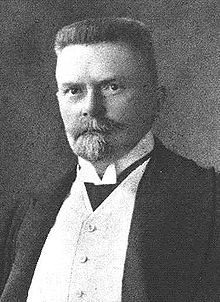Karel Kramář
Karel Kramář (born December 27, 1860 in Vysoké nad Jizerou , Austrian Empire ; † May 26, 1937 in Prague ) was a Czech and Czechoslovak politician , first Czechoslovak Prime Minister , chairman of the Czechoslovak National Democratic Party and chairman of the national association.
Life
Kramář studied law at the Universities of Prague , Berlin and Paris and obtained a doctorate in law. He was also active as a writer and founded the newspaper "Čas" . He soon joined the Young Czechs and ran for them successfully in the Imperial Council elections in the constituency of Deutschbrod (today Havlíčkův Brod ). Later he represented the New Town of Prague ( Nové Město ) in the Vienna Imperial Council. Since 1901 Kramář acted as club chairman of the Young Czech faction, in 1907 he also took over the office of vice-president of the Imperial Council.
After the outbreak of the First World War , Kramář came more and more into sharp opposition to the Habsburg Monarchy and advocated independence for the Czechs and Slovaks. Even before the war began, Kramář had formulated the idea of an independent kingdom of the Czechs and Slovaks under the tsar's scepter in a letter to the Russian Foreign Minister Sasonov . In May 1915, although he was actually immune as a member of parliament, he was arrested by the Austro-Hungarian authorities and charged with high treason , including his marriage to a Russian woman. A military court sentenced Kramář to death, but the sentence was not carried out. In 1917 Kramář was released from prison as part of an imperial amnesty and then resumed his political activities.
In the summer of 1918 he was elected chairman of the National Committee (Narodní výbor československý) by the Czech deputies of the Imperial Council. On October 26, 1918, when the collapse of the Habsburg monarchy was already clearly emerging, Kramář traveled to Geneva as head of a delegation from the National Committee. There he negotiated with Edvard Beneš , Tomáš Garrigue Masaryk's most important collaborator and spiritus rector of the Paris National Council of Exiled Czechs, about the details of the establishment of a Czechoslovak state. Two days later, independent Czechoslovakia was proclaimed simultaneously in Prague, Geneva and Washington DC. Kramář supported the election of Tomáš Garrigue Masaryk as head of state and took part with his Foreign Minister Edvard Beneš in the Paris peace negotiations, in which Czechoslovakia was also awarded the Carpathian Ukraine . From November 1918 to June 1919 he was the prime minister of the country's first regular government . Despite this success, strikes and demonstrations in the spring of 1919 led to a serious government crisis in Prague. In June 1919, Kramář suffered a bitter defeat in the first democratic (local) elections: his National Democratic Party came in third behind the Social Democrats, who received over 50% of the vote, and the Agrarian Party. Kramář drew the consequences and resigned as Prime Minister on July 7, 1919. Later attempts to return to government failed, as did his attempt to be elected Masaryk's successor in 1935. He is buried in the Olšany Cemetery in Prague.
literature
- Goldinger: Kramář Karel. In: Austrian Biographical Lexicon 1815–1950 (ÖBL). Volume 4, Verlag der Österreichischen Akademie der Wissenschaften, Vienna 1969, pp. 202–204 (direct links to p. 202 , p. 203 , p. 204 ).
- Andreas P. Pittler: Karel Kramář - From the cell into the government . In: Andreas P. Pittler (ed.): From the Danube Monarchy to a united Europe. 20 members of the Reichsrat who made history . Wieser, Klagenfurt 2003, ISBN 3-85129-409-2 .
- Martina Winkler : Karel Kramář (1860–1937). Self-image, external perceptions and understanding of modernization of a Czech politician . Oldenbourg, Munich 2002, ISBN 978-3-486-56620-8 (= Ordnungssysteme , Volume 10, also dissertation at the University of Leipzig 2002).
Web links
- Newspaper article about Karel Kramář in the 20th century press kit of the ZBW - Leibniz Information Center for Economics .
| personal data | |
|---|---|
| SURNAME | Kramář, Karel |
| BRIEF DESCRIPTION | Bohemian-Czechoslovak politician |
| DATE OF BIRTH | December 27, 1860 |
| PLACE OF BIRTH | Vysoké nad Jizerou |
| DATE OF DEATH | May 26, 1937 |
| Place of death | Prague |
